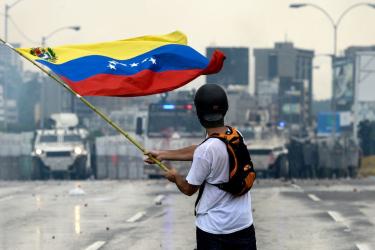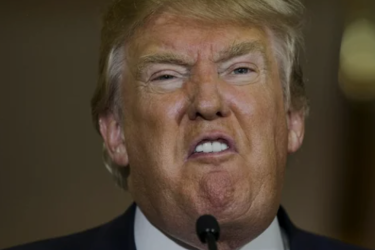Marea Socialista

Against U.S. imperial war on Venezuela! An interview with Marea Socialista’s Gonzalo Gómez

Marea Socialista: Against bureaucratic authoritarianism and capitalist exploitation in Venezuela
Venezuela: Chavismo on the horns of a dilemma

Over three months in the early part of last year, Venezuela was subjected to a campaign of violence and
Venezuela: Thousands debate socialist congress proposals

An activist with the Baruta Battle Unit Bolivar-Chavez (UBCh).
Revolutionary democracy in the economy? Venezuela’s workers' control movement

The workers at Grafitos del Orinico are proud of their collectively run factory. Photo by Ewan Robertson.
France, WSF, Korea ... International left solidarity with the Egyptian people's uprising
Below are a number of statements and reports of solidarity actions around the world following the overthrow of the US-backed Egyptian dictator Hosni Mubarak. They include a statement from organisations attending the New Anti-Capitalist Party congress in France, solidarity from the World Social Forum in Dakar, Senegal, a statement by leaders of the Socialist Party USA and a report on trade union organised protests in South Korea. Check back for more.
* * *
Statement from left organisations present at the New Anti-Capitalist Party congress
February 12, 2011 -- The overthrow of Ben Ali and Mubarak change the political situation not only in the Maghreb but on the international scale.
Borges: W kierunku demokratyzacji i jedności ruchu robotniczego
[2008-07-19] W
ostatnich wyborach w związku zawodowym Narodowa Unia Sił
Nauczycielskich (Sindicato Nacional Fuerza Magisterial, Sinafum),
skupiającym istotną część nauczycieli, zdecydowane zwycięstwo odniósł
Orlando Pérez, zwolennik pozostania Sinafum w federacji związkowej
Narodowa Unia Robotników (Unión Nacional de Trabajadores, UNT). Wybory
ogłoszono także w Krajowej Federacji Pracowników Sektora Publicznego
(Federación Nacional de Trabajadores del Sector Empleados Públicos,
Fentrasep), do której należy około 90 proc. urzędników. Mają się one
odbyć 1 października. Komisja Krajowa UNT wyznaczyła w sierpniu kongres
i wybór nowych władz. Te informacje, podobnie jak pogłębianie się
procesu rewolucyjnego, to świetne wiadomości dla wenezuelskich
robotników.
W
ostatnich wyborach w związku zawodowym Narodowa Unia Sił
Nauczycielskich (Sindicato Nacional Fuerza Magisterial, Sinafum),
skupiającym istotną część nauczycieli, zdecydowane zwycięstwo odniósł
Orlando Pérez, zwolennik pozostania Sinafum w federacji związkowej
Narodowa Unia Robotników (Unión Nacional de Trabajadores, UNT). Wybory
ogłoszono także w Krajowej Federacji Pracowników Sektora Publicznego
(Federación Nacional de Trabajadores del Sector Empleados Públicos,
Fentrasep), do której należy około 90 proc. urzędników. Mają się one
odbyć 1 października. Komisja Krajowa UNT wyznaczyła w sierpniu kongres
i wybór nowych władz. Te informacje, podobnie jak pogłębianie się
procesu rewolucyjnego, to świetne wiadomości dla wenezuelskich
robotników.
Venezuela: Defend and deepen the Bolivarian Revolution with an armed and mobilised people
By Marea Socialista, translation by International Viewpoint
July 28, 2010 -- Following the provocations of the Colombian regime, which threatens an armed intervention on Venezuelan territory under the false pretext that the latter was sheltering FARC guerrilla bases, President Hugo Chavez has decided to suspend all diplomatic relations with Colombia. It is clear that once again the Colombian regime is acting as a perfect satellite of the United States which is moreover currently dramatically increasing militarist manoeuvres and tensions all around the globe. We publish below a statement by the Venezuelan revolutionary Marxist organisation Marea Socialista, with which the Fourth International has fraternal relations.
The provocation from Uribe and the drugs traffickers who dominate the Colombian regime stretches to a limit of extreme tension relations between Colombia and Bolivarian Venezuela. The right, the oligarchy and the Venezuelan pro-Yankees present the attitude of President Chavez as an electoral manoeuvre or a problem exploited by the government out of propaganda concerns and chauvinism.
Venezuela: Workers’ control and the contradictions of the Bolivarian process

Gustavo Martínez interviewed by Susan Spronk and Jeffery R. Webber
June 21, 2010 – The Bullet – On June 10, 2010, we caught up with Gustavo Martinez, a union leader in the worker-controlled, nationalised coffee company, Fama de América, in Caracas, Venezuela. The company has 350 workers at the national level, with two separate plants – one in Caracas and one in Valencia. We sat down with Martínez to discuss the centrality of workers’ control in the ongoing struggle to transition toward socialism and some of the most pressing contradictions of the Bolivarian process in Venezuela today.
* * *
To start off, can you tell us your name, how long you've worked in this coffee company, your job in the company, and your role in the union?

